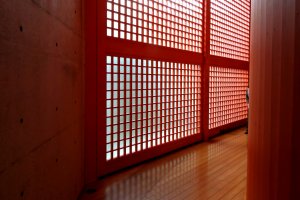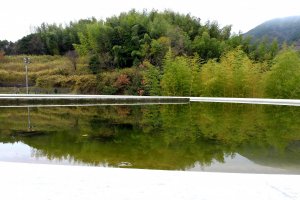Awaji Island is home to two treasures of modern architecture designed by Tadao Ando and built in the decade following the Great Hanshin Earthquake centered on the island. They are Yumebutai, a sprawling hotel/conference center/garden, and Honpukuji, the Water Temple. I visited the Water Temple in March 2016.
If you are interested in architecture, you will almost certainly know the name of Tadao Ando. His designs are striking in their simplicity, and the way they harmonize with their locations. I was convinced concrete was the ugliest building material in the world until I saw pictures of Ando designed buildings, but concrete is his signature material, and his imagination elevates it to great beauty.
The Water Temple is an excellent example of Ando's re-interpretation of the Japanese aesthetic. Surrounded by Awaji countryside of rice fields and bamboo woods, it blends into the setting. The first sign you are approaching a building is when you see a high concrete wall. A small red torii at one end signifies that this is a spiritual place.

Entering a door in the wall reveals another high concrete wall with a graceful curve. A white gravel path symbolizing purification leads you to a shallow oval pond which is also the roof of the temple. In March the pond reflects the hills and sky, but in summer it is covered with lotus blooms. The lotus flower is a symbol of heaven.
A narrow stairwell extends like a jetty out into the pond, and descending beneath the pond brings you into a temple interior absolutely glowing with rich red color. Another curved wall, this time of red lattice, encircles the heart of the temple creating a curved outer corridor flooded with natural light. This corridor was my favorite part of the temple.

I also really loved the effect created by natural light pouring through the red lattice behind the altar. Temple altars are usually dark, illuminated by lamps and candles. Seeing the statue of Buddha and all the altar fixtures and fittings back-lit with natural light was magnificent!
Ando's buildings have been compared to haiku because of their zen-like simplicity and their sensory appeal. Awaji Island's Honpukuji - the Water Temple – is a kind of poetry I could really enjoy!































